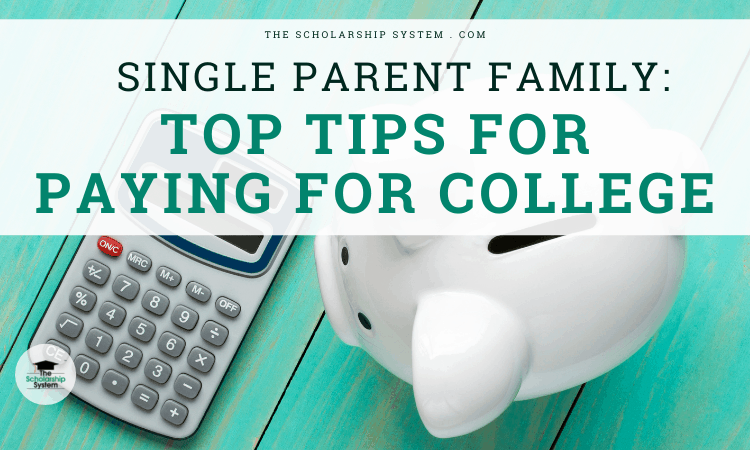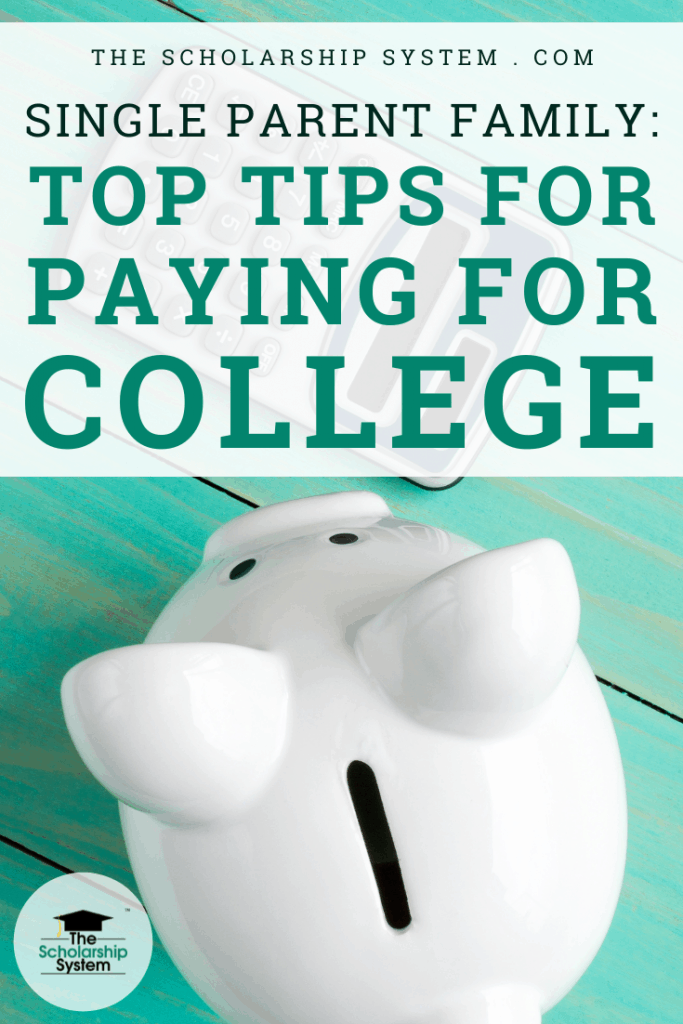Updated on July 14th, 2022
As a single parent, paying for a child’s college can seem like a daunting task. You may only have one income to work within your household, limiting your ability to save. Even if you receive child support, there might not be much leftover in the end, making you wonder if you’ll be able to contribute much to your student’s college fund.
Scholarships can make your student’s education much more affordable, reducing the stress many single parents feel. If you and your student want to learn more about scholarships for students of single-parent homes, sign up for our free college scholarship webinar! Take a quick trip over to http://thescholarshipsystem.com/freewebinar to reserve a spot today.
Luckily, you can do things as a single-parent family to make paying for college for your student easier. If you aren’t sure where to begin, here are some top tips for paying for college as a single parent.
Contents
Top Tips for Paying for College
Financial Planning for Single Parents
If your student has some time before they’ll be heading to college, a bit of financial planning now can make a world of difference. Even small amounts saved can add up, allowing a single parent paying for a child’s college to get more set aside than they might expect.
Certain financial planning for single parents steps is worth pursuing. Here are some straightforward options.
Spending Reductions
If you’re trying to figure out how to save money as a single mom or dad and aren’t sure where to begin, reducing your expenses is typically the simplest way to get started. While cutting back on dining out, entertainment, vacations, and similar optional spending can be difficult; it may give you a chance to fee up money in your budget that can go into savings.
Additionally, reevaluating your recurring expenses is wise. For example, you may be able to find reduced insurance rates by changing providers. The same can apply to cell phone service, internet, and even electricity if you live in a competitive market.
See a Low-Cost Financial Advisor
If you’re looking for financial help for single parents, finding a low-cost financial advisor that specializes in one-parent households could be a wise move. It will let you get expert advice on how you can get control of your budget and save intelligently, allowing you to contribute more to your student’s education.
Quite a few organizations even offer the service on a sliding scale (or free) if you meet the income requirements. If you’re looking for financial help for a single parent with students, here are some places that might be able to offer you guidance:
- American Consumer Credit Counseling
- Foundation for Financial Planning
- National Foundation for Credit Counseling
You can also talk to your bank or credit union, as they may have services available to their customers. The same can go with your workplace, as some companies offer financial planning assistance as a benefit.
Set Up a 529 Plan
If time is on your side, setting up a 529 plan could let you set aside money for college. Your investment can grow over time, often at a rate that outperforms a savings account.
Another benefit of a 529 plan is that you can ask loved ones to contribute to the account. Third-party contributions are allowed, creating a way for family members and friends to help your student achieve their college dreams if they are able.
Dedicate Tax Breaks to the College Fund
Single parents usually qualify for a child-related tax break or two. If you get a refund back after you file, setting that money aside for your student’s college could be an easy way to boost your savings.
Since the cash arrives as a windfall instead of part of your usual income, it may be easier to shift money toward a 529 plan without hurting your budget. Plus, if your tax refund is substantial, it lets you make a lot of progress fast.
Increase Household Income
Increasing your household’s total income can give you more money to set aside for college. If you have the time, consider launching a side hustle to supplement your usual earnings. Even survey sites and rebate apps can be opportunities to boost a college fund, allowing you to send a bit more to savings without too much effort.
Once your child gets old enough to contribute, encourage them to find ways to earn some money. That way, they can add some cash to their college fund, too, allowing you to make progress from more than one angle.
Seeking Out Scholarships
As a single parent paying for a child’s college, encouraging your child to apply for scholarships is an excellent idea. Scholarships are a great option for funding a college education without debt. Any money received doesn’t have to be paid back, and many can help with a range of college costs, including tuition, room, board, fees, equipment, and more.
Students are usually eligible to apply for a wide variety of scholarships. Some are open to students at large. Others may concentrate on particular majors, demographics, or financial need.
If you and your student want to learn more about scholarship opportunities, sign up for our free college scholarship webinar! Head over to http://thescholarshipsystem.com/freewebinar to secure a spot right away.
Are There Scholarships for Students of Single Parent Homes?
Yes, there are scholarships for students of single-parent homes. However, the exact requirements do vary dramatically. Some awards may focus on students who lost a law enforcement, public safety, or military-associated parent in the line of duty. Others may limit applicants to those who lost a parent due to a workplace accident.
You can also find options that apply to students with an incarcerated parent, and a few may concentrate on students of divorced parents. There are also funds for students who lost a parent to specific medical conditions or events.
Usually, you can learn about the available options by conducting a scholarship search. However, to make the start of that journey easier, here are a few scholarships for students of single-parent homes that are worth exploring:
- American Legion Legacy Scholarship
- Ayo & Iken Children of Divorce Scholarship
- Ava’s Grace Scholarship
- Colwell Law Group Single Parent Scholarship
- David J. Ewing Scholarship
- Encore Scholarship Program
- Family Scholarship Fund
- Gloria Borges Wunderglo Foundation Scholarship
- Iraq and Afghanistan Service Grant
- Life Lessons Scholarship Program
- Lisa Michelle Memorial Fund
- Macy’s Emergency Scholarship Fund
- Miller Law Group Child of Divorce/Single Parent Household Scholarship
- Naomi Scholarship
- Police Family Survivors Fund Scholarship
- Postsecondary Education Scholarship Program
- Quell Foundation Scholarship
- Single Parent Household Scholarship
- Vincent Bennett, Jr. Memorial Scholarship
As with all scholarships, eligibility criteria can vary among the options listed above. As a result, your student should read the requirements carefully before applying.
When it comes to financial aid, the FAFSA is one of the most critical parts of the equation. It can help your student access grants and need-based scholarships. Plus, it can be the basis for work-study programs, giving your student another option for funding their education that doesn’t involve debt.
However, if your student is open to loans, the FAFSA can help with those as well. After they complete their application, federal student loans may become available, giving them an alternative to private student loans.
In many cases, the FAFSA for single parents approach is essentially the same as it is for divorced parents. Most of the information will focus on the custodial parent, allowing them to complete the application with relative ease.
Scholarships can make your student’s education much more affordable, reducing the stress many single parents feel. If you and your student want to learn more about scholarships for students of single-parent homes, sign up for our free college scholarship webinar! Take a quick trip over to http://thescholarshipsystem.com/freewebinar to reserve a spot today.









Leave a Reply